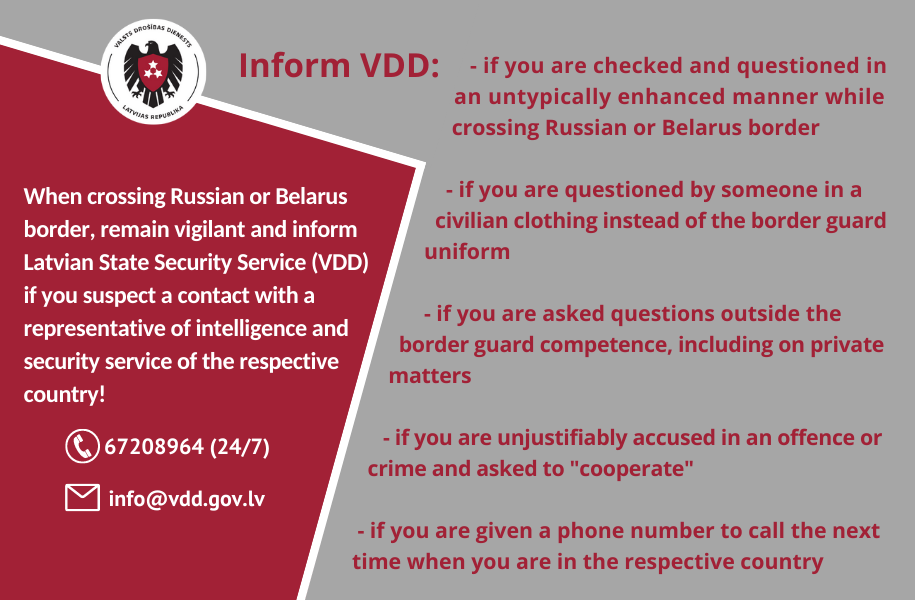
Latvian State Security Service (VDD) advises Latvia’s residents to avoid all travel to Russia and Belarus during the upcoming Easter holidays, and reminds about the high risks of intelligence and recruitment in the territory of these countries.
Russia continues its war in Ukraine, committing severe war crimes and threatening the security of whole Europe. In such circumstances, threats to Latvia’s national security have not decreased. Aggressor state Russia and its close ally Belarus have demonstrated attempts to extend various hybrid attacks against our country, including organizing harmful activities against a number of objects in Latvia.
The activities of Russia’s and Belarus’ intelligence and security services have become more aggressive. These services try to use all means to obtain intelligence about NATO and European Union member states, including Latvia.
Currently the possibilities of Russia’s and Belarus’ intelligence and security services to obtain intelligence within the territory of Latvia are limited. Therefore intelligence and security services of both aggressor states regularly try to recruit Latvian citizens who have entered their territory. VDD warns that the intelligence and security services of Russia and Belarus within the territory of their respective country will not hesitate to use threats, blackmail and other illegal methods to try to force someone into collaborating.
VDD reminds that the first engagement attempt often takes place at the border control point, as the officers of the intelligence and security service present themselves as border guards or use other covers – those of law enforcement institutions or any other Russia’s or Belarus’ institution. Moreover, officers of Russia’s and Belarus intelligence and security services can obtain information that is crucial to them even during a simple conversation.
In the light of the abovementioned, VDD strongly advises Latvia’s residents to avoid all travel to Russia and Belarus during the upcoming Easter holidays. In case travelling to these aggressor states cannot be avoided, VDD recommends not taking your mobile phone with you, especially if it contains information related to your professional activity or otherwise sensitive information. At the border control point data can be extracted from your mobile phone, it can also be infected with spyware. In this case, the safest choice is a mobile phone with a pre-paid SIM card, which can be discarded after the travel. You should also avoid bringing your computer, USB sticks and other data mediums.

VDD suggests to note the below stated signs that may indicate contact with an officer from Russia’s or Belarus’ intelligence and security service during the border crossing:
• unusually expanded inspection and questioning;
• the person performing the questioning is wearing civilian clothing instead of the border guard uniform;
• the person asks questions outside the border guard competence, such as situation in Latvia, attitude towards developments in Ukraine, war refugees that have entered Latvia, Latvia’s support to Ukraine;
• questions of private nature are asked – place of employment, professional duties, financial situation;
• you are presented with charges of committing an offence or crime, thus trying to force you to collaborate in exchange for dropping the charges;
• you are given a phone number to call next time you are in the respective country.
In case of suspicions about contact with an officer of Russia’s or Belarus’ intelligence and security services, VDD urges to inform the Service about it either over the 24/7 phone +371 6720 8964 or via e-mail info(abols)vdd.gov.lv. VDD guarantees the confidentiality of the information provider.
Information prepared by VDD



